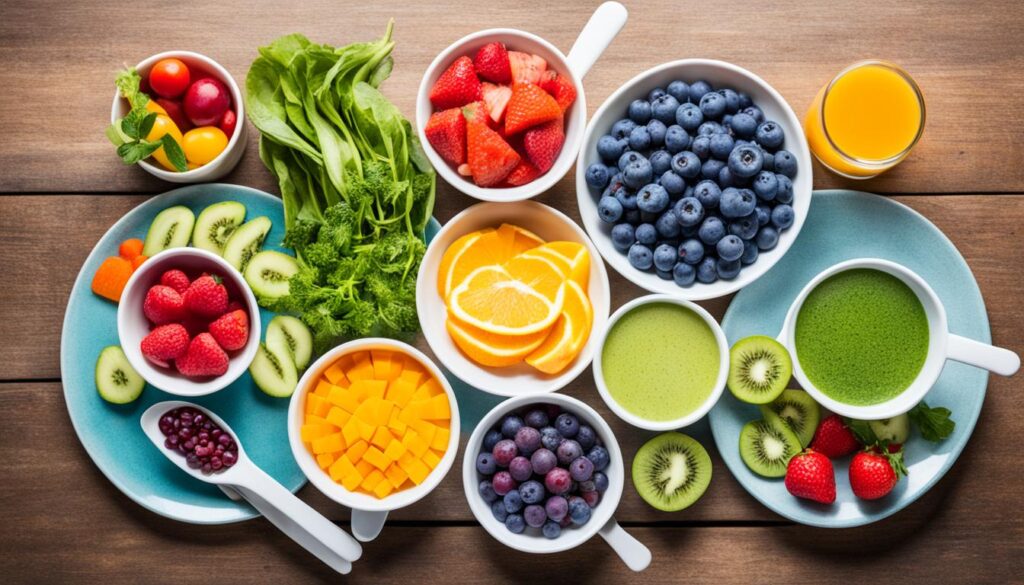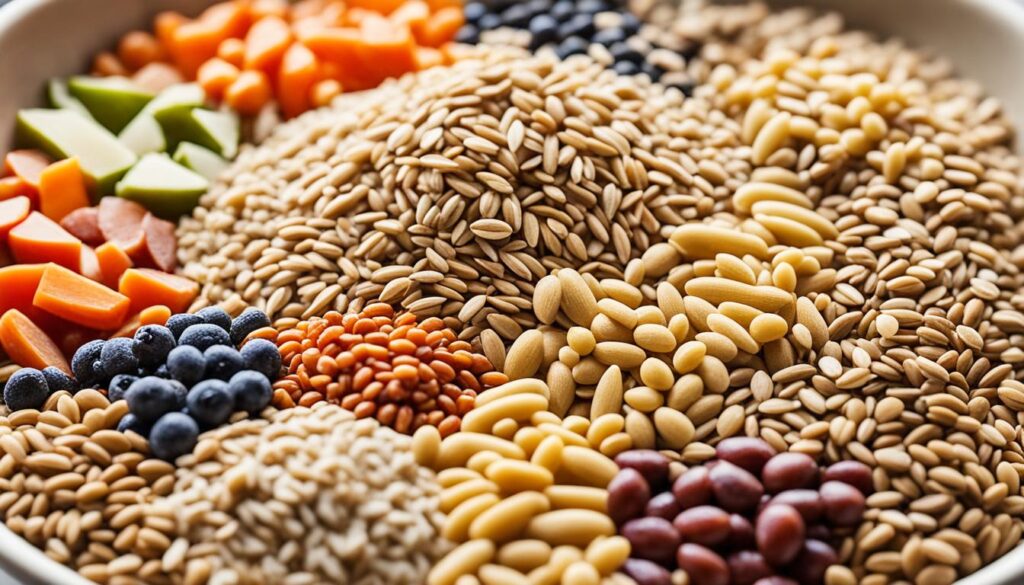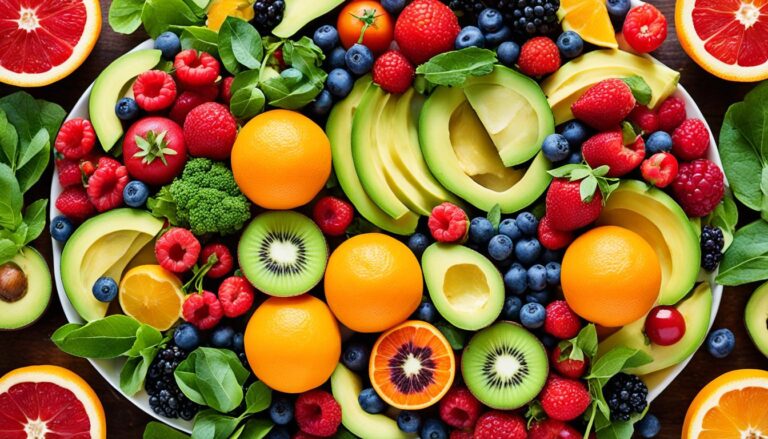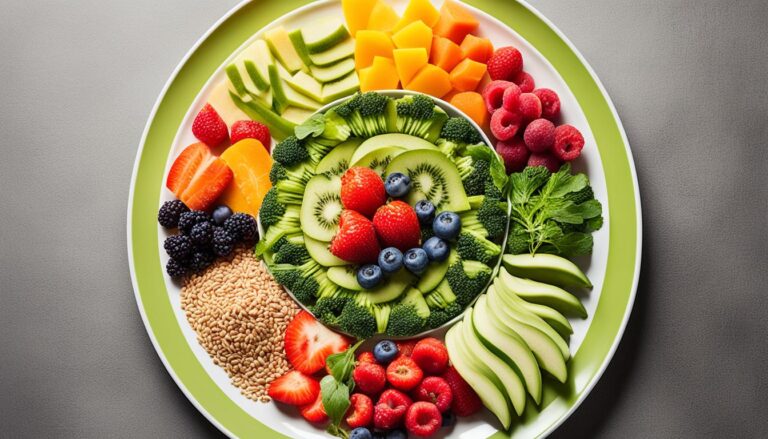Do you want more energy and to manage your weight better? Eating right can make a big difference. You’ll be amazed how good food choices can change your life.
Key Takeaways
- A healthy diet protects against chronic diseases like heart disease, diabetes, and cancer.
- Eating a variety of foods, including whole grains, fruits, vegetables, and lean proteins, is key to good nutrition.
- Reducing salt, sugar, and unhealthy fats can significantly improve your health.
- Small, sustainable changes to your diet and lifestyle can have a big impact.
- Consulting with a healthcare professional can provide personalized dietary guidance.
Eating well is crucial for a good life. The U.S. Department of Health and Human Services, along with Agriculture, say this. They underline the power of a balanced diet against many diseases. The Mayo Clinic also supports healthy eating. They offer tips on cooking and have books like Cook Smart, Eat Well.
Have a balanced mix of cereals, fruits, veggies, and some animal products. Watch the salt, sugar, and bad fats. Doing this will make you much healthier. The Mayo Clinic even sells supplements to help you stay healthy.
For parents, breastfeeding and choosing fresh, natural foods for kids is key. Less fat and sugar, as well as salt, keeps us healthy. Changing your diet a little and keeping it up can do wonders for your body and mind. Are you excited to start your health journey? Let’s do it!
The Importance of a Balanced Diet
Eating well is key to feeling and living your best. A good diet mixes carbs, protein, fats, vitamins, and minerals. Make sure to eat a lot of nutrient-rich foods like whole grains, lean meats, and plenty of fruits and veggies. This ensures your body gets everything it needs to work right.
Consuming the Right Nutrients for Optimal Health
Macronutrients are your main source of energy. They help you grow, stay healthy, and manage your weight. Micronutrients, though, are crucial for your immune system, bones, and to avoid not getting enough nutrients. A mix of these foods lowers your chances of heart problems, diabetes, and some cancers.
The Role of Macronutrients and Micronutrients
Remember, you need the right mix of carbs, proteins, and fats to stay fit and feel good. Vitamins and minerals also play a huge part in your body’s tasks. Knowing about both big and small nutrients helps you eat smarter. This way, your body gets all it needs to be in top shape.
Eating a balanced diet is one of the most important things you can do for your health. It helps you maintain a healthy weight, reduces your risk of chronic diseases, and provides your body with the nutrients it needs to function at its best. – Registered Dietitian, John Doe
Choosing a mix of nutritious foods is vital for your health and happiness. It’s not just about not being sick. It’s about giving your body what it needs to run smoothly, fight off bad stuff, and enjoy life.
Building Healthy Eating Habits
Having healthy eating habits is key for our long-term health. This means planning meals and choosing foods carefully. With a little effort, we can keep our diets well-balanced and avoid unhealthy eating out.
Meal Planning and Preparation Strategies
Planning your meals is all about making a schedule and a list. It can really help you save time and money, and you won’t waste food. This way, eating healthy becomes easier. There are tricks like batch cooking and using slow cookers. These are great for anyone with a busy life. Adding regular exercise to good eating can help you keep your weight in check and feel better overall.

What you eat matters a lot. Make sure your meals have all the good stuff your body needs. Look for natural, unprocessed foods. They are packed with the nutrients that keep us going strong. Eating a variety of plant foods, such as fruits and veggies, can help you manage your weight. It also lowers the chance of getting sick.
Putting effort into planning and cooking can really boost your health. It’s not just about being healthy it’s about feeling good. This way, we can take control of what we eat. And that can make a big difference for our health.
Eating a healthy, balanced diet can have a profound impact on your physical and mental well-being. It’s all about making small, sustainable changes to your daily routine.
By planning our meals and paying attention to what we eat, we make a strong start. This approach helps us focus on foods that are good for us. That leads to better health and a life that’s more enjoyable.
Understanding Food Groups
Eating a balanced diet is key for good health. It’s all about knowing food groups and what they give us.
Grains, fruits, vegetables, proteins, and dairy are the main groups. They each bring different nutrients for our body’s needs. For example, 1 ounce of grains is in a slice of bread or 1/2 cup of rice. You can get 1/2 cup of fruit from a fresh piece or 1/4 cup of dried fruit.
Vegetables have vitamins and minerals. Options include 1 cup of spinach or 6 baby carrots. Protein foods like meats, fish, and eggs help our muscles grow. Dairy, such as milk, provides calcium for strong bones.
To be healthy, eat from all the food groups. It helps us get all we need each day for health. ChooseMyPlate.gov offers tips on making smart food choices.
Learning about food groups helps you plan a healthy diet. It’s good for your body and mind. With good info, you can make choices that keep you well.
Incorporating More Fruits and Vegetables
Fruits and veggies are key to a healthy diet. They’re full of vitamins, minerals, and fiber. Eating them boosts health and makes you feel good.
The Benefits of Eating a Rainbow of Produce
Try to eat a variety of fruits and vegetables in all colors. This makes meals look good and boosts the nutrients you get.
Many studies show that more of these foods lower the risk of diseases. The American Heart Association says to fill half your plate with them daily. They also recommend 4½ cups of each type every day.
That’s not all they’re good for. They also help manage weight and keep your digestive system healthy. They make you feel full, keep your sugar levels steady, and help you go to the bathroom well. Having 9 cups of fruits and veggies, any type, every day is the target.
It doesn’t matter if they’re fresh, frozen, canned, or juiced. Eating more of them boosts your health and mood.
Adding colorful and flavorful fruits and veggies to your meals is a great step towards being healthier.

Eat the rainbow the more colors you have on your plate, the more nutrients you’re getting.
Lean Protein Sources
Protein is key for our body. It helps repair tissues, grow muscles, and do many body jobs. Eating enough protein with exercise keeps muscles strong, helps control weight, and boosts health.
Go for lean protein like poultry, fish, and beans. They are better than fatty meats because they are rich in protein but low in bad fats and calories. These choices are good for you because they also provide fiber.
The Importance of Protein in a Healthy Diet
For adults eating 2,000 calories a day, you should aim for 5.5 ounces of protein. This is 10-35% of your total daily calories. If you’re active, you might need between 1.2 and 2.0 grams of protein for each kilogram you weigh daily.
Eating a mix of lean proteins keeps you healthy. Some good options are:
- White-fleshed fish, like cod, with high protein and low fat.
- Skinless white poultry meat, rich in protein.
- Lean beef, with less than 10 g of fat, but good protein content.
- Beans, peas, and lentils, with plenty of protein in a small serving.
- Plain Greek yogurt, better than regular yogurt in protein content.
- Tofu, a plant-based option with a good amount of protein.
For vegans and vegetarians, there are many options too. Foods like beans, lentils, nuts, and soy are great sources of protein. Combine these with regular workouts to keep muscles, weight, and health in check.

Incorporating a variety of lean protein sources into your diet can help you meet your daily protein needs and support overall health.
Whole Grains The Fiber Rich Choice
Whole grains like whole wheat and quinoa are vital for a healthy diet. They keep the whole grain, including the germ and bran, which are packed with nutrients. This makes them rich in fiber, vitamins, and minerals. Plus, whole grains help you feel full, aid digestion, and keep your blood sugar steady. Eating more whole grains cuts your risk of heart disease, diabetes, and some cancers.
About half of the grains we eat should be whole, say the Dietary Guidelines for Americans. But, many of us in the U.S. fall short on whole grains. To up your game, choose whole grain foods instead of refined kinds. This boosts your meals and snacks with extra nutrition.
Whole grains are excellent for your heart, helping with blood pressure and cholesterol. They are also full of antioxidants, which fight inflammation. When shopping, look for the Whole Grain Stamp to pick out true whole grain foods.
Adding a variety of whole grains to your diet gives you a big mix of nutrients and health perks. Choices like bulgur, oats, and quinoa are great for your body. Just by switching to whole grains, you can boost your health and feel better.

Whole grains are a simple way to boost your fiber intake and support your gut health, weight management, and blood sugar control.
Diet and Nutrition
The Correlation Between Diet and Overall Well-being
The link between diet, nutrition, and our health is clear. Eating a variety of healthy foods can greatly benefit both our body and mind. It helps our immune system, heart, and fights off diseases like obesity and diabetes. What we eat also affects our gut health. And this isn’t just about our stomach, it influences our moods and brain power. But, not eating well can lead to problems like stomach issues, tiredness, and even mental health troubles.
Choosing good food is key for full health. Focusing on fresh, unprocessed items keeps us healthy and fights off illness.
Good nutrition can help reduce the risk of many chronic diseases, including heart disease, diabetes, and certain types of cancer. World Health Organization
A balanced diet does wonders for us. The right mix of foods is great for our whole self. For the best health, we need a mix of fruits veggies grains, lean meats, and good fats.
But, too much processed stuff, sugar, and bad fats can harm us. It’s about making smart food choices every day. This is a big part of staying well.
Reading Nutrition Labels
Learning to read nutrition labels is key for those wanting to eat better. These labels list details about food like how many carbs, proteins, and fats are in them. They also show the vitamins, minerals, calories, sodium, and sugar. By knowing how to read these labels, you can pick foods that are good for you. You can also keep an eye on the nutrients you get each day.
Deciphering Nutritional Information
When you look at a nutrition label, the first thing to check is the serving size. For instance, one cup of frozen lasagna has 280 calories. Eating two cups means you’re eating 560 calories. Each serving has 9g of total fat. So, two servings have double that, which is 18g.
It’s also important to look at saturated fat, sodium, and sugar levels. Let’s say a serving of lasagna has 4.5g of saturated fat, and two servings would have 9g. One serving might contain 850mg of sodium, while two servings would supply 1700mg.
Don’t forget about other nutrients like fiber, protein, vitamins, and minerals. A portion of lasagna has 4g of fiber, but twice that if you eat two servings. You’ll also get 15g of protein in one serving, or 30g if you double it.
The %DV on labels is very useful. It tells you whether a food is low or high in a certain nutrient. Less than 5% means low, but over 20% is high. Knowing how to use the %DV helps you make choices that are right for your health.
Reading labels might seem hard at first, but it gets easier with practice. Use what you know about daily nutrient needs. This will help you eat in a way that keeps you healthy.
Deciphering nutrition labels is a skill that can pay dividends for your health. By understanding the information they provide, you can make more informed decisions about the foods you consume and take an active role in your wellness journey.
| Nutrient | 1 Serving | 2 Servings |
|---|---|---|
| Calories | 280 | 560 |
| Total Fat | 9g 12% DV | 18g 24% DV |
| Saturated Fat | 4.5g 23% DV | 9g 46% DV |
| Sodium | 850mg 37% DV | 1700mg 74% DV |
| Dietary Fiber | 4g 14% DV | 8g 29% DV |
| Protein | 15g | 30g |
Nutrition labels are a great tool for choosing what we eat wisely. By understanding how to read them, you can compare various foods. This helps you pick the ones that are good for you. It also guides you in keeping track of your daily nutrients like sugar, sodium, and fiber. With this knowledge, you can be in charge of your health by making smart food choices.
Hydration and Its Role in Health
Keeping hydrated is key for good health. About 60% of our body is water. It helps us control our temperature, move nutrients around, and keep our organs working right. Being hydrated prevents feeling tired, getting headaches, and thinking slowly.
How much water we need each day changes with our age, gender, and how active we are. But, adults usually should drink 6-8 glasses of water or other healthy drinks a day. This keeps us healthy, helps us manage our weight, and keeps our skin looking good. It also lowers the chances of getting sick.
Not drinking enough water can really hurt how well we think and move. Losing 1-3% of our body weight in water can make us think slower. And not drinking enough can mess with our memory and mood, making us perform poorly.
More water means less headaches for many people. Almost half of the men who drank more water saw their headaches lessen. Scientists aren’t completely sure yet, but it looks like water could be a good way to get rid of a headache. And keeping hydrated keeps our bowel movements normal.
For people who do sports, being dehydrated can drag them down. Athletes often sweat out 6-10% of their water weight while working out. This can really hurt their performance. So, drinking enough water is crucial for people who exercise a lot.
In the end, being hydrated is vital for health. It helps our brains, our bodies, and even our sports performance.
Managing Portion Sizes
Controlling portion sizes is key for a healthy diet and weight management. Big portions often mean too many calories, leading to weight gain. The U.S. FDA has updated serving sizes on food labels to reflect how much people actually eat. It raised the ice cream serving size from 1/2 cup to 2/3 cup.
Strategies for Mindful Eating
Mindful eating means paying close attention to your meals. It lets you know when you’re full and when you’re really hungry. This awareness helps in making better food choices and managing your weight.
Here are some good techniques for keeping an eye on portion sizes:
- Use smaller plates and bowls to automatically eat less.
- Eat slowly and notice when you’re full. This can prevent eating too much.
- Don’t eat straight from the bag or box. You might eat more without realizing it.
- Write down what you eat daily. This can help you see your habits and maybe lose some weight.
At home, it’s also important to:
- Eat at a slower pace and use smaller plates. This encourages eating less.
- Freeze extra food to stop overeating and have easy meals for the future.
- Figure out why you eat unhealthy foods when you’re not really hungry. This can help you avoid them later on.
These approaches to portion control and mindful eating lead to a nourishing diet and better weight management.
| Key Principles for Portion Control | Benefits |
|---|---|
| Choosing less energy-dense foods, high in fiber and water content | Makes managing portion sizes easier |
| Waiting 20 minutes before opting for a second helping | Helps understand if you’re really hungry32 |
| Measuring portions using cups and spoons | Keeps serving sizes consistent |
| Reducing starchy carbohydrates on the plate | Stops overeating when adding more bread or rice |
By using these tips and being mindful of eating, you can greatly improve your diet and health.
Portion control is not about depriving yourself, it’s about being mindful of what and how much you eat. With a little practice, it can become a sustainable habit for a healthier life.
Remember, controlling portion sizes and mindful eating are critical for a well-rounded diet. Being aware of what we eat can help us reach our health goals.
Dietary Supplements Pros and Cons
Dietary supplements are a good way to top off nutrients you might miss in your meals. They can be especially useful if you can’t eat certain foods or need extra support for your health. But, be careful because they aren’t checked as closely as medicine.
They might not work well with other meds or could cause side effects. Always talk to a doctor before starting any supplement plan to make sure it’s safe for you.
Remember, the best way to get your nutrients is from food, not just pills. Foods are filled with different nutrients that help each other work in your body. But, sometimes, supplements are good when you’re missing some vitamins or need help with a health problem.
- Common examples of dietary supplements include vitamins C and D, fish oil, echinacea, melatonin, calcium, iron, and probiotics.
- Dietary supplements can help improve overall health and may reduce the risk of some health conditions, as recommended by healthcare professionals.
- Folic acid is linked to a lower risk of fetal development issues.
- Omega-3 fatty acids in fish oil are associated with improved heart health.
- Calcium and vitamin D can help slow down bone loss.
- Vitamins A, C, and E are linked to eye health.
- Some dietary supplements such as St. John’s wort and rosemary have antioxidant qualities.
- Probiotics support digestion and the immune system.
- Magnesium promotes sleep and healthy digestion.
Dietary supplements have their good and bad points. They can sometimes cause stomach issues, headaches, or make you very tired. The worst cases can lead to severe health problems or make some medical treatments not work as they should. They can also clash with medicines, changing how these drugs work.
Always talk to a healthcare pro about any supplement first. Remember, supplements aren’t meant to treat diseases. They’re not as strictly controlled as medicines either. Working with your doctor helps you use supplements wisely for a better healthy lifestyle.
In closing, dietary supplements can be a good support for health and wellness, but they need to be used wisely with professional advice. Understanding both the pluses and minuses of these products is key to making smart health choices.
Conclusion
Sticking to a healthy diet is vital for our health and wellness. Knowing about macronutrients and micronutrients helps us get the nutrients our bodies need. Eating a mix of good foods like fruits, veggies, lean proteins, and whole grains is key. These foods help us stay healthy and avoid getting sick. They also keep our minds sharp.
Start living healthier with small steps that you can keep up. Teach kids to be healthy and share what you know. This way, they’ll grow up knowing how to eat right and stay healthy. Eating together as a family makes meals fun. It also helps families grow closer. Giving kids choices at meals can stop fights over food.
As we learn more about the link between what we eat and our wellness, we should listen to the experts. They can show us how to eat better and be healthier. A balanced diet is the secret to a long and happy life.





